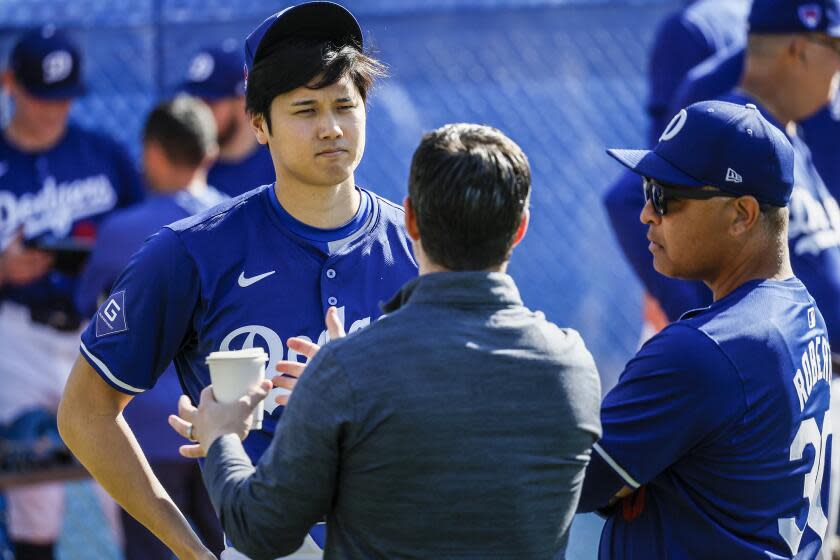Minus 'buffer' of Ippei Mizuhara, Dodgers engaging more directly with Shohei Ohtani

There has been plenty of fallout accompanying the scandal surrounding Shohei Ohtani and his former interpreter Ippei Mizuhara.
The confusion it caused among the Dodgers fan base. The distractions it threatened to create for the team. The way it could all impact Ohtani’s play individually, in particular, in the first season of his 10-year, $700-million contract, given how integral Mizuhara was in his daily training and preparation routines.
“That’s his personal life,” teammate Freddie Freeman said of the situation, which has seen Ohtani accuse Mizuhara, his longtime interpreter and close friend, of stealing money from Ohtani’s bank account to pay off gambling debts to an allegedly illegal bookmaker.
“That’s a lot [to handle],” Freeman said.
Read more: What to know about the Shohei Ohtani interpreter gambling scandal
On Tuesday, however, Dodgers manager Dave Roberts pointed to what he argued could be at least one silver lining.
As far as baseball-related communications with Ohtani are concerned, a “buffer,” as Roberts described it, has been removed from the equation with Mizuhara’s firing last week.
Though Mizuhara was viewed as a “gatekeeper” between Ohtani and players and staff, according to multiple people not authorized to speak publicly about the Dodgers' internal dynamics, there might now be more open lines of dialogue between Ohtani and his new team.
“I would argue that it's gonna help relations internally,” Roberts said, a day after Ohtani addressed the situation publicly for the first time. “I've already seen it. You know, the last couple of days, I think Shohei has been even more engaging with his teammates. And I think there's only upside with that.”
Perhaps this is nothing more than a convenient, and exaggerated, narrative; some sort of revisionist history meant to spin some parts of the last week’s events as a potential positive in the long run.
Before the gambling and theft allegations against Mizuhara, after all, club officials weren’t raising alarms about their ability to communicate with Ohtani. Before last week, no one had publicly flagged issues with Mizuhara’s role in communicating with the team’s star offseason addition.
However, it’s no secret that interactions with Ohtani differed from that of other players.
Going back to his time with the Angels, Mizuhara played an outsized role in how Ohtani engaged with his teams over the years.
Previously, that had largely been viewed as a good — or, at least, necessary — dynamic. Ohtani had a trusted adviser who ensured no exchanges with teammates or coaching staff members would get lost in translation, the thinking went. Mizuhara was seen as a close friend who not only understood the complexities of Ohtani’s life as an international superstar, but had seen the two-way talent’s popularity explode first-hand.
Former Angels manager Joe Maddon once reportedly told a Japanese outlet that the pair meshed together like "peanut butter and jelly.”
It was with Mizuhara by his side that Ohtani emerged as arguably the sport’s best player.
Right up until Mizuhara’s firing last week, his bond with Ohtani was believed to be a key asset.
The unusual part of the arrangement, people around the Dodgers have recounted in recent days, is how staunchly Mizuhara acted like a barrier to the two-time MVP — even in interactions around Ohtani’s new clubhouse.
“It was difficult,” Roberts said bluntly when asked if his coaching staff had to relay baseball-related dialogue to Ohtani through Mizuhara. “It was difficult. Yeah.”
Multiple staff members said they were never directly instructed, by either club executives or anyone in Ohtani’s camp, to go through Mizuhara with thoughts, advice or questions related to his game. They were never outwardly barred from approaching Ohtani himself.
Read more: NL West preview: Is it still the Dodgers' division to lose? Can Giants challenge?
However, the assumption among Dodgers staff was that Ohtani preferred such a second-hand system. He operated under seemingly similar circumstances during his time with the Angels. And staffers were still conscientious of the fact English isn’t the 29-year-old’s first language.
“It was tough to adjust away from, with the language barrier,” one person said.
That’s why, in the wake of Mizuhara’s firing last Wednesday, the Dodgers have been pleasantly surprised with what hitting coach Aaron Bates described as a “pretty seamless” transition, communication-wise.
Ohtani and Dodgers coaches have conversed more directly in the dugout and the clubhouse, according to multiple coaches. They’ve talked with Ohtani in English more often of late than they did when Mizuhara was present.
“I think that we're all going to be surprised how much English he knows,” Roberts said with a telling grin. “And I think that's a good thing.”
Additionally, Ohtani’s acting interpreter, Will Ireton, is a longtime Dodgers baseball operations staff member. Formerly the interpreter for Kenta Maeda before becoming manager of performance operations, Ireton’s communication skills have received rave reviews from people across the organization.
“Will is a secret weapon,” Roberts said. “I'm telling you, this guy is as selfless as a person as you're gonna find.”
The Dodgers, of course, are only one week into this new reality. A few days of functional communication with Ohtani doesn’t mean unforeseen problems won’t arise in Mizuhara’s absence.
But, in search of any optimistic story lines in the wake of the ongoing scandal, Roberts was adamant about at least this one.
“I do think that it's an opportunity,” Roberts said of the team’s budding relationship with Ohtani, “for us to kind of really support him from everywhere.”
Sign up for more Dodgers news with Dodgers Dugout. Delivered at the start of each series.
This story originally appeared in Los Angeles Times.

